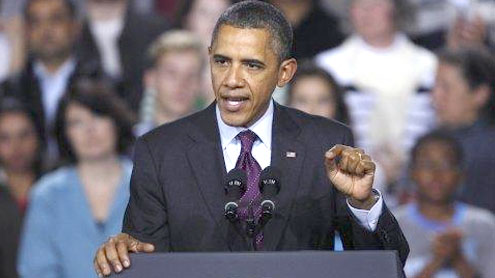 The Obama administration is increasingly embracing Uzbekistan as a critical ally helping to supply US soldiers in Afghanistan, even as watchdogs allege new human-rights abuses in the central Asian republic by security forces who subject citizens to electric shock, asphyxiation, and rape.
The Obama administration is increasingly embracing Uzbekistan as a critical ally helping to supply US soldiers in Afghanistan, even as watchdogs allege new human-rights abuses in the central Asian republic by security forces who subject citizens to electric shock, asphyxiation, and rape.
The latest report by Human Rights Watch provides a catalog of alleged horrors in Uzbekistan’s prisons that includes “the use of electric shock across a wide spectrum of criminal cases” and the reliance on asphyxiation as a “torture technique.” The report says to suffocate their victims, Uzbek police often affix gas masks to their victims’ faces and then close the valves. Or they use plastic bags. On top of that, the report lists “beatings with rubber truncheons and “rape and sexual humiliation.”
Uzbekistan, a former Soviet republic that borders Afghanistan, has opened vital new supply lines for US forces. Since US military operations can no longer be supplied from Pakistan, to the south, all supplies except ammunition and guns — everything from food, water, and fuel to concertina wire, oil drums, and spare parts—have to be brought in through the “Northern Distribution Route,” which goes through Uzbekistan, ironically along the old trade routes that stretch back centuries.
A spokesman for the Uzbek embassy in Washington did not return a call seeking comment of the human-rights report. The State Department doesn’t dispute the report’s findings and says it has its own concerns about Uzbek human rights. But it sees “no contradiction” in the administration’s increasingly close relationship with the republic.The US “has ongoing, serious concerns about the state of human rights in Uzbekistan and raises those concerns with the government of Uzbekistan every chance we get,” Robert O. Blake, assistant secretary of state for South and Central Asian Affairs, told ‘The Daily Beast’. He added that “human rights in Uzbekistan are going to improve because Uzbekistan determines it is in its own interest to improve them.”
In 2004 Congress banned military sales to Uzbekistan, because of its atrocious human-rights violations. But three months ago, as the push to improve supply lines to the Afghan war continued, the Obama administration and Congress introduced a waiver allowing military sales, even if human rights do not improve.Department of Defence officials, asked about human rights in Uzbekistan, referred all calls to the State Department.Steve Swerdlow, the author of the Human Rights Watch report, said in an interview that documenting the abuses is more important now than ever, given the way the US government is cozying up to the regime there. “There is a creeping argument,” he said, “that Uzbekistan is making some steps, that it is passing legal reforms, but what you have is just a lot of window dressing.”
“Uzbekistan,” he says, “has kicked out every reporter and international human-rights group. No one has been on the ground except diplomats. There has been no one on the ground like I was for years now.” Swerdlow himself was expelled from Uzbekistan in June.The report says that even as the Obama administration has come to rely increasingly on Uzbekistan in the Afghanistan war, things may be getting worse. “In several important respects, the situation has deteriorated,” the report says. “The government has moved to dismantle the independent legal profession and has closed off the country to independent monitoring and human rights work.”
In September, President Obama personally called President Islam Karimov. White House notes on the call do not make any reference to human rights. In October, Secretary of State Hillary Clinton visited Karimov to shore up ties further. Blake, in his statement, said that Clinton “raised human-rights issues with President Karimov,” while she was there.
The only public statement Clinton made on the issue while there, though, was not specific, and did not mention torture. “Uzbekistan,” she said, “needs to continue its reforms in rule of law, democracy, and human rights.”With America’s fraying ties to Pakistan, the other land route to the war, it’s likely that coalition forces will rely even more, in the future, on the Northern Distribution Network and Uzbekistan. – Kahleejnews












